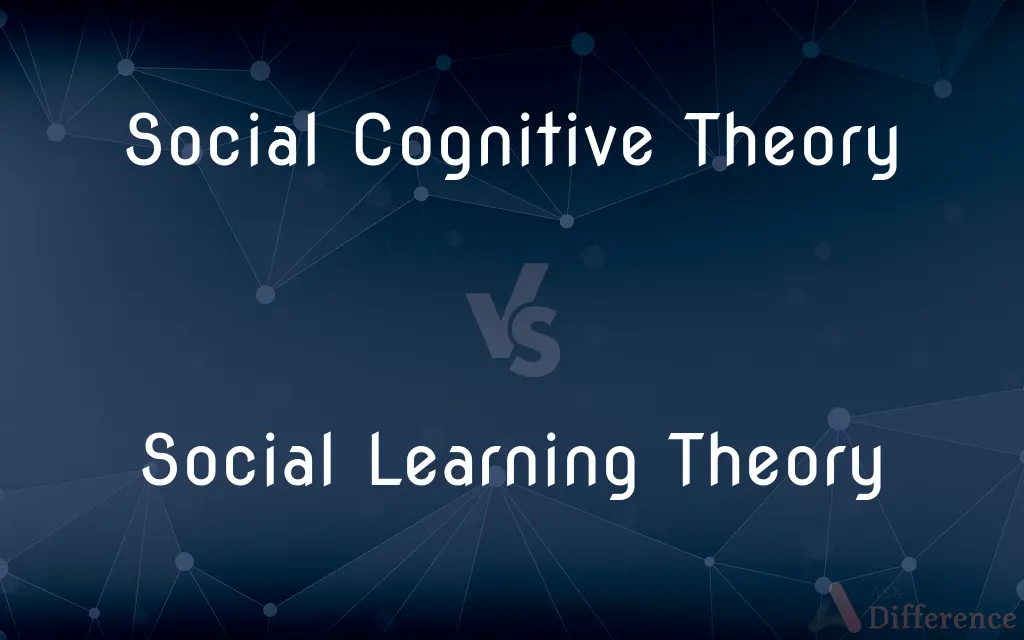Social Cognitive Theory vs. Social Learning Theory — What's the Difference?
By Tayyaba Rehman — Published on November 1, 2023
Social Cognitive Theory emphasizes the role of cognitive processes in social learning, while Social Learning Theory primarily focuses on learning through observation and imitation.

Difference Between Social Cognitive Theory and Social Learning Theory
Table of Contents
ADVERTISEMENT
Key Differences
Both Social Cognitive Theory and Social Learning Theory offer insights into how individuals learn from their environment. Social Cognitive Theory, proposed by Albert Bandura, goes beyond the concepts of Social Learning Theory by emphasizing the importance of cognitive processes, including beliefs, self-perceptions, and expectations. It underscores the role of self-efficacy, or an individual's belief in their capability to produce desired outcomes. On the other hand, Social Learning Theory, also rooted in Bandura's work, mainly focuses on how individuals learn behaviors by observing others. This theory posits that behaviors can be acquired through the simple act of observation without direct experience.
Social Cognitive Theory and Social Learning Theory both recognize the importance of observational learning. However, Social Cognitive Theory delves deeper into the cognitive mechanisms that influence behavior, such as attention, memory, and motivation. In contrast, Social Learning Theory is primarily concerned with the idea that observing a behavior can lead to its replication, given that certain conditions are met, like attention, retention, and motivation.
Interestingly, while Social Learning Theory is often considered a precursor to Social Cognitive Theory, the latter has a broader scope. Social Cognitive Theory encompasses the tenets of Social Learning Theory but introduces other dimensions like symbolizing capabilities, self-regulation, and self-reflectiveness. Social Learning Theory, in its essence, postulates that behavior, environment, and cognition all interact, affecting the learning process.
While both theories have been instrumental in understanding human behavior, Social Cognitive Theory offers a more comprehensive perspective by recognizing the active role individuals play in their learning, considering their beliefs and perceptions. Conversely, Social Learning Theory serves as a foundation, introducing the basic concepts of how behavior can be acquired in a social context.
Comparison Chart
Main Focus
Emphasizes cognitive processes
Focuses on learning through observation and imitation
ADVERTISEMENT
Introduced by
Albert Bandura
Albert Bandura
Incorporates Self-belief
Stresses the importance of self-efficacy
Doesn't emphasize self-efficacy as strongly
Scope
Broader, includes tenets of Social Learning Theory
More narrow, primarily observational learning
Consideration of Cognition
Prioritizes cognitive factors like beliefs and perceptions
More focused on observable behaviors
Compare with Definitions
Social Cognitive Theory
Emphasizes cognitive processes in learning.
Social Cognitive Theory investigates how beliefs influence behaviors.
Social Learning Theory
Highlights the importance of reinforcement in learning.
Social Learning Theory emphasizes that behaviors can be strengthened or weakened by consequences.
Social Cognitive Theory
Examines the interplay of personal, behavioral, and environmental factors.
Social Cognitive Theory recognizes the dynamic interaction between a person's beliefs, their behaviors, and their environment.
Social Learning Theory
Investigates how behavior, cognition, and environment interact.
Social Learning Theory acknowledges the role of cognitive processes in determining whether a behavior will be imitated.
Social Cognitive Theory
Highlights observational learning and cognitive evaluations.
Social Cognitive Theory posits that people can learn simply by observing others.
Social Learning Theory
Describes the conditions needed for effective modeling.
According to Social Learning Theory, attention and memory are vital for learning through observation.
Social Cognitive Theory
Focuses on self-efficacy and outcome expectations.
According to Social Cognitive Theory, strong self-efficacy can enhance performance.
Social Learning Theory
Considers imitation as a form of learning.
Through Social Learning Theory, we understand that seeing a peer rewarded for a behavior can lead to imitation.
Social Cognitive Theory
Considers self-regulation in behavior.
Through Social Cognitive Theory, researchers understand how individuals regulate their actions.
Social Learning Theory
Focuses on learning through observation.
Social Learning Theory suggests children can learn aggression by watching aggressive behaviors.
Common Curiosities
Did the same individual introduce both theories?
Yes, both theories were introduced by Albert Bandura.
How does Social Cognitive Theory view self-efficacy?
It emphasizes the importance of self-efficacy in influencing behavior and outcomes.
Why is observational learning important in both theories?
Both theories recognize that individuals can learn behaviors without direct experience, simply by observing others.
Are both theories still relevant in modern psychology?
Yes, both theories continue to influence understanding and research in human behavior and learning.
What's the primary difference between Social Cognitive Theory and Social Learning Theory?
Social Cognitive Theory delves deeper into cognitive processes, while Social Learning Theory mainly focuses on observational learning.
Does Social Cognitive Theory consider external factors?
Yes, it considers the interaction between personal, behavioral, and environmental factors.
How does reinforcement relate to Social Learning Theory?
Social Learning Theory posits that behaviors can be strengthened or weakened based on reinforcement or punishment.
Can Social Learning Theory be considered a subset of Social Cognitive Theory?
In some respects, yes, as Social Cognitive Theory has a broader scope and encompasses many tenets of Social Learning Theory.
How do the two theories view the role of cognition in learning?
While both acknowledge cognitive aspects, Social Cognitive Theory places a greater emphasis on cognitive processes.
Which theory gives more importance to self-regulation?
Social Cognitive Theory gives more emphasis to self-regulation in understanding behavior.
Share Your Discovery

Previous Comparison
Green Eyes vs. Hazel Eyes
Next Comparison
Santa Claus vs. Father ChristmasAuthor Spotlight
Written by
Tayyaba RehmanTayyaba Rehman is a distinguished writer, currently serving as a primary contributor to askdifference.com. As a researcher in semantics and etymology, Tayyaba's passion for the complexity of languages and their distinctions has found a perfect home on the platform. Tayyaba delves into the intricacies of language, distinguishing between commonly confused words and phrases, thereby providing clarity for readers worldwide.












































